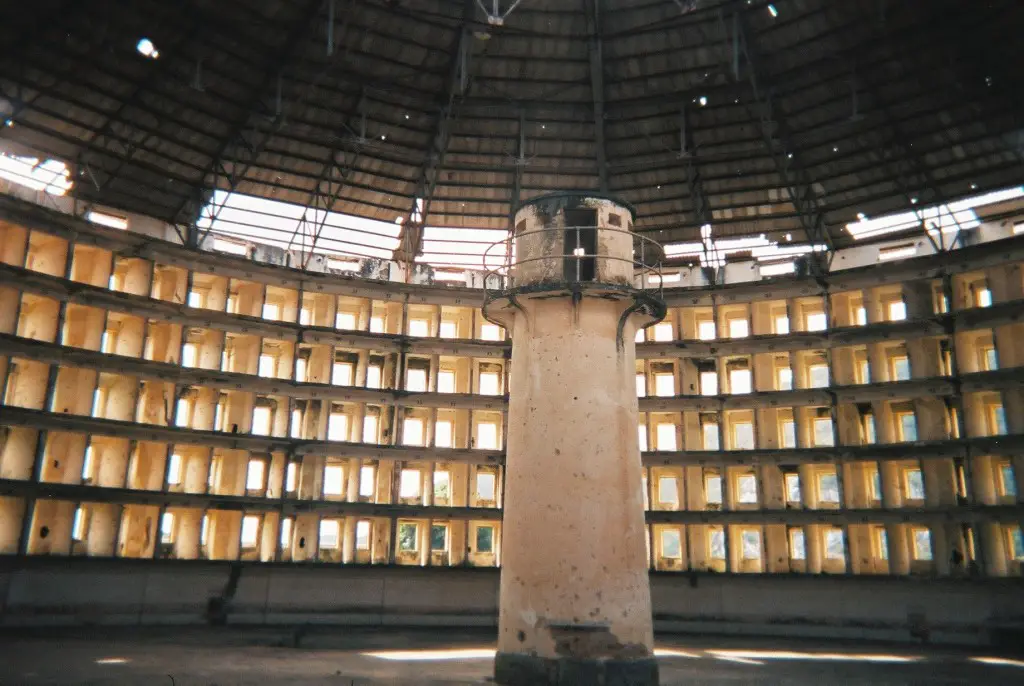Suzanne Collins’ “The Hunger Games” changed the Young Adult genre. When “Harry Potter,” and later, “Twilight,” were first published, they became such instant hits that they created whole new subgenres. “Twilight” popularized Teen Romance, and “The Hunger Games” spawned the YA Dystopian Novel.
So yes, within the Young Adult community, “The Hunger Games” was a big deal, and yes, the fact that it was made into four movies (continuing the “Harry Potter” and “Twilight” pattern) supports that claim. So “The Hunger Games” is popular. I think it’s fair to say that. And I am recommending you read these books, regardless of how old you are.
But, don’t get me wrong about why I’m recommending them. While it’s true that I love the Young Adult genre, I’m also a History major with an interest in 20th Century Europe. “The Hunger Games Trilogy” is my favorite book series because of my Academic Background, and it’s that background that makes me recommend them to you.
Foucault in “The Hunger Games”
“The Hunger Games” takes place in a post-apocalyptic United States, the remains of a land that has been ravaged by floods, earthquakes, and war. In the ruins of all this death and decay, Panem rises, a country consisting of 13 Districts, governed by the single city of the Capitol, separated from most Districts by a significant geographic distance.
These Districts rose in rebellion against the Capitol 74 years before the story starts. The Capitol responded not only by completely destroying District 13, but also by creating a “Treaty of Treason” (HG19) to prevent further rebellion. Under this treaty, each District is required to hold an annual “Reaping” where they will offer up two Tributes, a boy and a girl between the ages of 13 and 18, to fight to the death in an arena for the Capitol’s amusement.
The ceremony is steeped in symbolism and propaganda that I won’t get into here, but the movie does a good job of representing the Capitol’s take on the situation. What you need to know for the sake of my argument is that after these tributes are chosen, they’re taken to the Capitol, where they’re paraded around like reality TV stars for a week before they are sent into the monitored arena to try to kill each other. The book is told from the point of view of one of these captives.
But, I was supposed to talk about history, wasn’t I? Well, there is, of course, the Roman Coliseum and the legacy of violence as sport and entertainment as distraction that it spawned. The Coliseum is actually explicitly referenced in the third book, when one of the characters explains that Panem, the name of the country these horrors are set in, comes from the Latin phrase, “Panem et Circensus” which literally translates to Bread and Circuses.
The Arena, along with generating revenue for the capitol, was also a social event, much like the Roman Coliseum. The organizers get a chance to make themselves famous, the citizens get to engage with the action by betting on winners and the participants fight for their lives as all of these wealthy Romans/Capitol citizens watch.
What’s different about “The Hunger Games” then, is not the voyeurism of the spectacle, but the forced celebration. The Hunger Games as an event are broadcast throughout the Districts and peacekeepers watch to make sure the Districts are watching as their friend, family or neighbor is killed while the rest of the nation cheers. We don’t see a lot of these scenes in the books themselves, but Katniss talks about her family, about what they must be thinking as they watch her and what she has to do to keep them safe, enough that they’re never far from our minds as readers.
The Hunger Games, we’re constantly reminded, even as we as readers take pleasure in the pain and distress of the children trapped in the arena, is a form of discipline for those in the districts. Kelly Wezner elucidates on the idea at play here in her essay, “Perhaps I am Watching You Now: Panem’s Panopticons.”
She explains that, according to Foucault, “Punishment, then, becomes a spectacle staged more for the watchers than for the condemned, for the principal object of punishment becomes the deterrent of others rather than the rehabilitation of the prisoner” (BB149). Given that all the prisoners in this case will die, that makes a lot of sense.
Wezner, as many academics studying “The Hunger Games” do, then goes on to explain how Panem, and to an even greater degree, “the arenas themselves are panoptic structures” (BB149). The Panopticon, a theoretical prison designed by English philosopher Jeremy Bentham in the 18th century, is a large circular prison with a single guard tower that is positioned so that a sentry can see inside any cell at any time.
The prisoners, however, cannot see the sentry, and so must assume that they are being watched at all times. Under Foucault’s theory that he develops in his book “Discipline and Punish,” “Something real, such as the panopticon, depends on something fictional—the omnipresent idea of punishment” (BB149). We can certainly see that in the way that Katniss interacts with the cameras in the Arena. She knows that she’s constantly being watched, and so she polices all of her actions based on the possibility that the audience might be watching at that moment or that the Gamemakers might edit the footage later.
In addition, she constantly thinks about consequences of every part of herself, even of her personal feelings. She lives in a constant state of perceived danger, one that she only stops performing for when she is too injured to remember it.
The Capitol as a Colonizing Force
What these interpretations fail to take into account however, is just what the Districts do for the Capitol. If they’re so much trouble to keep docile, why allow them to exist at all? The answer is not “Because it would be immoral to kill our citizens” because the books make it incredibly clear, through the merciless killing of the people in the Districts, that they are not Capitol citizens. And though Panem cannot function without them, they’re not really the core of Panem either.
They are, even if no one ever says the word, colonies of the Capitol’s empire.
Foucault talks about perceived violence, but the Capitol, but the Capitol backs up its threats, as is demonstrated with the appearance of the Avoxes, former rebels whose tongues are cut out and are forced into servitude as punishment for their actions.”
This, however, is all steeped in theory and the politics of a fictional universe. While interesting, and certainly relevant to my major, thought experiments don’t explain the relevance of “The Hunger Games” to our consumerist and post-colonial society.
Here’s where the thought experiments end.
Remember when the Capitol blew up District 13 to send a message to the rest of the rebels? It turns out there’s some pretty horrifying historical precedent there. In the 1920s, after the Ottoman Empire dissolved, Great Britain obtained much of the land, including Mesopotamia, what is current day Iraq, as colonies.
In May 1920, the Sunni and Shia banded together to rebel against the British colonizers, prompting Britain to send over 100,000 British and Indian troops. They quelled the rebellion, but not before losing hundreds of soldiers and, more importantly to them, thousands of pounds. In the wake of World War I, Britain couldn’t afford those losses.
Desperate to make sure that this sort of large-scale rebellion couldn’t happen again, Winston Churchill and Hugh Trenchard instituted a practice that became known as “aerial policing.” The idea of aerial policing was that British RAF forces would fly over disobedient or possibly rebellious Iraqi villages and bomb them before they could do any real damage, destroying potential enemies and sending a clear message to those who might try and rise up against them.
It was, in every way possible, a campaign of terror. In the same way, the Capitol’s decision to nuke District 13, leaving nothing but irradiated waste in its place, was a move calculated to terrify the rest of the Districts into accepting Capitol rule. The Hunger Games were then instituted to constantly remind the Districts of the Capitol’s power and threaten them should they ever try to rebel.
And that’s just one instance of physical damage. Colonialism encompasses more than just targeted violence against a group of people; on it’s own, that’s usually classified as a hate crime. No, the goal of Colonialism is complete control over the colonized, in mind, body and soul. Well, let’s see how the Capitol handles the minds, bodies, and souls of its colonies.
Here’s where all that philosophy comes in. Let’s, for sake of argument, say that Foucault’s theory encompasses the policing of both the mind and soul. There’s certainly enough evidence, through Katniss’ first person narration, that she is constantly thinking about the Capitol and its effect on her life, mostly because of its ability to monitor her. The appearance of Haymitch, the drunk and washed out victor of his year’s Hunger Games years ago makes a good case for the loss of soul, and combined with Katniss’ own policing of her emotions, I feel confident asserting that the Capitol polices the souls of its citizens as well.
Which leaves bodies. There are three ways to think about the policing of bodies. There’s direct modification, reproduction and distribution of essential resources, like clothes and food. Direct modification happens mostly for the tributes themselves, as they’re put through a practical gauntlet of “beautification” rituals, from the stripping of hair from their bodies to tattoos to skin coloring.
Katniss wonders if they’ll “Dye [her] skin magenta and plant gems in it” or “cut decorative patterns in [her] face (CF49)” as the stylists assigned to her tut over her naked body. Reproduction is not a theme of the series, so we can skip that. Which leaves us with the distribution of essential resources.
Colonialism exists because the colonizers expect to profit from their colonies. When King Leopold II ruled the Congo and forced the inhabitants to work on rubber plantations for him, he set quotas that every village had to meet, otherwise hostages would be taken and shot. The brutal practice got results, but at horrific and incredibly inhumane costs.
In the 1800s, the most common caricature of the Irish in British newspapers was that they were a lazy people who starved because they didn’t farm enough of their own food, never mind the amount of textile, timber and vegetables they exported to Britain. Indians, meanwhile, were branded a violent race especially dangerous to the virtues of British women, a far-reaching lie that had deadly consequences.
And Panem? In Panem, every District has one main export, though the degree to which they’re monitored and expected to provide that export varies District by District. For instance in District 12, which exports coal, the residents are expected to work even when sick or under dangerous conditions, otherwise they wouldn’t get paid, and thus, wouldn’t eat.
The Capitol spends so much money and energy on keeping its colonies loyal, or at the very least, subservient, because it relies on them. Monetarily and materially, the Capitol needs the Districts. Without them, it has no resources. And it does everything it can to keep the Districts from realizing that.
These Books Don’t Sound Very YA…
While I won’t deny that there’s a trend of exploring darker and more disturbing topics normally designated “too mature for children” in current Young Adult literature, I’d argue that “The Hunger Games” doesn’t actually fall in that category. I read the books when I was 12, after all. I won’t deny that “The Hunger Games” is disturbing—that is one of the points of them— but they’re not excessively gory.
More importantly though, after setting up this cruel, violent and terribly familiar world, Suzanne Collins shows her characters defying it. I won’t spoil the ending, because I am recommending you read the books, but even without knowing how it ends, the minor acts of rebellion create something that really shouldn’t exist in this sort of dystopia: hope.
Michael Macaluso and Cori McKenzie argue that Panem is not, in fact, a Foucauldian totalitarian state because it has weaknesses that the citizens are able to exploit, like the broken bits of un-electrified fence that Katniss is able to crawl through in order to legally hunt (PP103).
Macaluso and McKenzie reject the dichotomy of powered versus powerless because, they argue, Katniss clearly demonstrates her power with her little acts of rebellion throughout the book. Although I don’t think the dichotomy is that easily collapsed, it’s relevant that Katniss is not totally defeated by the circumstances she is forced to live under.
Katniss is inspirational, because although all my examples of colonialism were from a century or two ago (hey, I’m a historian, that’s what I study) colonialism isn’t quite a thing of the past. The legacies of manifest destiny and mass colonization still affect the countries seized in those times. Their religions, trade and bodies were policed in brutal and inhuman ways for decades, and it takes more than a little time to recover from that.
What “The Hunger Games” teach us though, is that it is possible to regain your autonomy under that kind of oppression. Katniss points out the little acts of rebellion that even the most powerless seeming people can achieve. “The Hunger Games” can be a Young Adult novel, because Katniss is able to have these acts of resistance. She finds freedom within her panopticon.



















